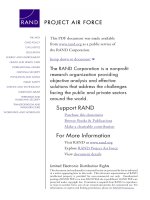OPTIMAL PROTECTION OF INTERNATIONAL LAW doc
Bạn đang xem bản rút gọn của tài liệu. Xem và tải ngay bản đầy đủ của tài liệu tại đây (1008.31 KB, 270 trang )
This page intentionally left blank
OPTIMAL PROTECTION OF INTERNATIONAL LAW
Assume, for a moment, that the necessary tools are available to
induce or even force states to comply with international law. In
such a state of affairs, how strongly should international law be
protected? More specifically, how easy should it be to change
international law? Should treaties be specifically performed or
should states be given an opportunity to “pay their way out”?
In the event of states violating their commitments, what kind of
back-up enforcement or sanctions should be imposed?
Joost Pauwelyn uses t he distinction between liability
rules, property protection and inalienable entitlements as a
starting point for a new theory of variable protection of
international law, placed at the intersection between “European
absolutism” and “American voluntarism.” Rather than
undermining international law, variable protection takes the
normativity of international lawseriouslyandcalibratesitto
achieve maximum welfare and effectiveness at the lowest cost to
contractual freedom and legitimacy.
joost pauwelyn is Professor of International Law at the
Graduate Institute of International and Development Studies,
Geneva. Previously, he was a law professor at Duke University in
the USA (2002–7) and an official with the World Trade
Organization (1996–2002). In 2005, he received the Paul
Guggenheim Prize for his book Conflict of Norms in Public
International Law (2003).
OPTIMAL PROTECTION OF
INTERNATIONAL LAW:
NAVIGATING BETWEEN
EUROPEAN ABSOLUTISM AND
AMERICAN VOLUNTARISM
JOOST PAUWELYN
CAMBRIDGE UNIVERSITY PRESS
Cambridge, New York, Melbourne, Madrid, Cape Town, Singapore, São Paulo
Cambridge University Press
The Edinburgh Building, Cambridge CB2 8RU, UK
First published in print format
ISBN-13 978-0-521-72859-1
ISBN-13 978-0-511-43708-3
© P.E. Kinzer 2008
2008
Information on this title: www.cambrid
g
e.or
g
/9780521728591
This publication is in copyright. Subject to statutory exception and to the
provision of relevant collective licensing agreements, no reproduction of any part
may take place without the written permission of Cambridge University Press.
Cambridge University Press has no responsibility for the persistence or accuracy
of urls for external or third-party internet websites referred to in this publication,
and does not guarantee that any content on such websites is, or will remain,
accurate or appropriate.
Published in the United States of America by Cambridge University Press, New York
www.cambridge.org
eBook
(
EBL
)
p
a
p
erback
CONTENTS
Table of cases [viii]
Table of treaties [xiii]
Table of international documents [xvi]
Acknowledgments [xviii]
Abbreviations [xix]
Foreword [xxv]
Introduction [1]
1 Overview and relevance of the analysis [5]
2 The two extremes of European absolutism and American
voluntarism [16]
3 Allocation, protection and back-up enforcement of
entitlements [26]
1 The basic model, its advantages and limitations [26]
2 Step 1: allocation of entitlements [30]
3 Step 2: protection of entitlements [32]
4 Step 3: back-up enforcement [36]
5 A framework for the protection of international law
entitlements [38]
4 How should international law entitlements be protected? [45]
1 The argument for a default rule of property protection [46]
(a) Contractual freedom and welfare maximization [47]
(b) Property protection requires less intervention [49]
v
2 When to protect entitlements as inalienable [50]
(a) Significant externalities [51]
(b) Moralisms and incommensurability [52]
(c) Paternalism [54]
3 When to protect entitlements under a liability rule [55]
(a) Hold-out [56]
(b) Free-load [59]
(c) High transaction costs [62]
4 Arguments for a lower level of protection in
international law [66]
(a) The need for flexibility to attract participation and
prevent exit [67]
(b) The consent rule as well as uncertainty may require
incomplete contracting and flexibility [68]
(c) Legitimacy concerns [72]
5 Arguments for a higher level of protection in
international law [75]
(a) Absence of collective valuation [77]
(b) The cost and possible errors of collective valuation [79]
(c) International entitlements as unique goods [83]
(d) Stability and the need to make credible commitments [85]
(e) Inequalities between states [90]
(f) States may not internalize costs or maximize welfare [93]
(g) States are not unitary actors [98]
6 A matrix to decide on how to protect international law
entitlements [102]
5 How are international law entitlements currently
protected? [107]
1 International law is, in principle, not inalienable [108]
2 International law is, by default, protected by a property
rule, not a liability rule [111]
3 An evaluation of inalienability in current international
law [117]
(a) The need for a more objective analysis [117]
contents
vi
(b) Collective obligations through the lens of
externalities, incommensurability and paternalism [122]
4 An evaluation of liability rules in current
international law [128]
(a) Cross-border environmental damage [130]
(b) Liability rules in the GATT/WTO [134]
(c) Investor protection under NAFTA and BITs [145]
6 Back-up enforcement in international law [148]
1 The puzzle of property protection backed-up by “mere”
compensation and proportional countermeasures [150]
(a) Good reasons to limit countermeasures to 1:1
retaliation [157]
(b) How 1:1 retaliation can achieve property protection:
the “kicker” of community costs [163]
(c) Community costs in a property regime as opposed to
a liability regime [172]
(d) How 1:1 retaliation can achieve property protection:
the hidden force of 1:1 retaliation itself [178]
2 The puzzle of jus cogens and collective obligations benefiting
from the weakest form of back-up enforcement [185]
(a) Default rules of back-up enforcement for community
obligations [187]
(b) An assessment: be careful what you wish for [194]
7 Conclusion [198]
References [207]
Index [220]
contents
vii
TABLE OF CASES
Arbitration
Responsibility of Germany for Damage Caused in the
Portuguese Colonies in the South of Africa (Naulilaa), 2 UNRIAA
(1928), 1,013 183
Trail Smelter, 3 UNRIAA (1938), 1,965 132
Case Concerning the Air Services Agreement of 27
March 1946 between the United States of America and France,
18 UNRIAA (1978), 417 161, 183–4
Kuwait v. Aminoil, Award of 24 March 1982, 21 ILM
976 (1982) 128
European Court of First Instance
Case T-315/01, Kadi v. Council of the European Union,
21 September 2005 (under appeal) 197
European Court of Justice
C-149/96, Portugal v. Council, 23 November 1999 141
International Court of Justice
Advisory Proceedings
Reservations to the Convention on Genocide, ICJ
Reports 1951,p.15 68
viii
Contentious cases
Gabc
ˇ
ı
´
kovo-Nagymaros Project (Hungary/Slovakia),ICJ
Reports 1997,p.7184
Case Concerning Armed Activities on the Territory of
the Congo (Democratic Republic of the Congo v. Rwanda)
(New application: 2002), Jurisdiction and Admissibility, 3
February 2006 117, 119
Permanent Court of International Justice
SS Lotus, PCIJ Series A no. 10 (1927) 130
Territorial Jurisdiction of the International Commission
of the River Oder, PCIJ Series A no. 23 (1929) 184
United States
Taylor v. Morton, 23 F Cas 784 (C.C. Mass. 1855)
(No. 13, 799), 67 US 481 (1862) 22
Sosa v. Alvarez-Machain, 542 US 692 (2004) 197
World Trade Organization
US – Gasoline
Appellate Body Report, United States – Standards for
Reformulated and Conventional Gasoline, WT/DS2/AB/R,
adopted 20 May 1996, DSR 1996:i, 3; Panel Report, United
States – Standards for Reformulated and Conventional
table of cases
ix
Gasoline, WT/DS2/R, adopted 20 May 1996, modified by
Appellate Body Report, WT/DS2/AB/R, DSR 1996:i, 29 169
US – Underwear
Appellate Body Report, United States – Restrictions
on Imports of Cotton and Man-made Fibre Underwear, WT/
DS24/AB/R, adopted 25 February 1997, DSR 1997:i, 11; Panel
Report, United States – Restrictions on Imports of Cotton
and Man-made Fibre Underwear, WT/DS24/R, adopted 25
February 1997, modified by Appellate Body Report, WT/
DS24/AB/R, DSR 1997:i, 31 169
EC – Bananas III (US) (Article 22.6 – EC)
Decision by the Arbitrators, European Communities –
Regime for the Importation, Sale and Distribution of Bananas –
Recourse to Arbitration by the European Communities under
Article 22.6 of the DSU, WT/DS27/ARB, 9 April 1999,DSR
1999:ii, 725 81, 140
EC – Hormones (US) (Article 22.6 – EC)
Decision by the Arbitrators, European Commu-
nities – Measures C oncerning Meat and Meat Products
(Hormones), Original Complaint by the United States –
Recourse to Arbitration by the European Communities under
Article 22.6 of the DSU,WT/DS26/ARB, 12 July 1999,DSR
1999:iii, 1,105 81, 140
table of cases
x
US – Section 301
Panel Report, United States – Sections 301–31 0 of the
Trade Act of 1974,WT/DS152/R, adopted 27 January 2000,
DSR 2000:ii, 815 143
Canada – Aircraft Credits and Guarantees
(Article 22.6 – Canada)
Decision by the Arbitrator, Canada – Export Credits
and Loan Guarantees for Regional Aircraft – Recourse to
Arbitration by Canada under Article 22.6 of the DSU and
Article 4.11 of the SCM Agreement, WT/DS222/ARB, 17 Feb-
ruary 2003, DSR 2003:iii, 1,187 91, 141, 158, 184
US – 1916 Act (EC) (Article 22.6 – US)
Decision by the Arbitrators, United States – Anti-
Dumping Act of 1916, Original Complaint by the European
Communities – Recourse to Arbitration by the United States
under Article 22.6 of the DSU, WT/DS136/ARB, 24 February
2004 81 , 153
US – Offset Act (Byrd Amendment) (EC)
(Article 22.6 – US)
Decision by the Arbitrator, United States – Con-
tinued Dumping and Subsidy Offset Act of 2000, Original
Complaint by the European Communities – Recourse to
Arbitration by the United States under Article 22 .6 of the DSU,
WT/DS217/ARB/EEC, 31 August 2004 12
table of cases
xi
US – Gambling (Article 22.6)
Decision by the Arbitrator, United States – Measures
Affecting the Cross-Border Supply of Gambling and Betting
Services, Recourse to Arbitration by the United States under
Article 22.6 of the DSU, WT/DS285/ARB, 21 December
2007 58 –9, 144
table of cases
xii
TABLE OF TREATIES
Agreement on Safeguards, 15 April 1994, entry into force 1
January 1995, 1869 UNTS 154 135
Agreement on Subsidies and Countervailing Measures,
15 April 1994, entry into force 1 January 1995, 1869
UNTS 14 135, 180, 183–4
Agreement on Trade Related Intellectual Property Rights,
15 April 1994, entry into force 1 January 1995, 1869
UNTS 299 135
Antarctic Treaty, 1 December 1959, entry into force 23 June
1961, 402 UNTS 71 122–3, 131
Convention for the Protection of Human Rights and Funda-
mental Freedoms, 4 November 1950,entryintoforce3
September 1953, 5 ETS 126, 165, 169
Convention for the Settlement of Investment Disputes
between States and Nationals of Other States, 18 March
1965, entry into force 14 October 1966, 575 UNTS 159 147
Convention on Civil Liability for Damage Resulting from
Activities Dangerous to the Environment, 21 June 1993
(not in force) 150 ETS 132
General Agreement on Tariffs and Trade, 15 April 1994, entry
into force 1 January 1995, 1867 UNTS 187 40–1, 58, 134–6,
142, 144, 169, 172, 183
General Agreement on Trade in Services, 15 April 1994, entry
into force 1 January 1995, 1869 UNTS 183 58 –9, 134, 136,
144–5
xiii
Geneva Convention (IV) Relative to the Protection of
Civilian Persons in Time of War, 12 August 1949, entry
into force 21 October 1950, 75 UNTS 287 123
International Treaty on Plant Genetic Resources for Food
and Agriculture, adopted 3 November 2001, entry into
force 29 June 2004, FAO/RES/3 (2001) 12
Kyoto Protocol to the United Nations Framework Conven-
tion on Climate Change, 11 December 1997, entry into
force 16 February 2005 10, 34–5, 60, 116, 124, 129–30, 185,
188, 196, 203–4
Montreal Protocol on Substances that Deplete the Ozone Layer,
16 September 1987, entry into force 1 January 1989, 1522
UNTS 261–2
North American Free Trade Agreement, 17 December 1992,
entry into force 1 January 1994, 32 ILM 289 82, 91, 126,
129, 141, 145–7, 172–3, 178, 205
Paris Convention on Third Party Liability in the Field of
Nuclear Energy, 29 July 1960, 956 UNTS 251 131
Treaty Banning Nuclear Weapon Tests in the Atmosphere, in
Outer Space and Under Water, 5 August 1963, entry into
force 10 October 1963, 480 UNTS 43 123
Understanding on Rules and P rocedures Governing the Settle-
ment of Disputes, 15 April 1994, entry into force 1 January
1995, 1869 UNTS 401 109, 136 , 138–40, 142, 14 4–5, 153, 173–4,
180, 183
United Nations Convention against Corruption, adopted 31
October 2003, A/RES/58/4 169
United Nations Convention on the Law of t he Sea, 10 December
1982,entryintoforce16 November 1994, 1833 UNTS 364–5,
69, 116, 119
table of treaties
xiv
Vienna Convention on Civil Liability for Nuclear Damage, 21
May 1963, 1063 UNTS 265 131
Vienna Convention on Diplomatic Relations, 14 April 1961,
entry into force 24 April 1964, 500 UNTS 95 112
Vienna Convention on the Law of Treaties, 22 May 1969,
entry into force 27 January 1980, 1155 UNTS 331 68, 108–11,
114–15, 118, 152, 189–90, 193
xv
table of treaties
TABLE OF INTERNATIONAL DOCUMENTS
Charter of Economic Rights and Duties of States, 12
December 1974, A/RES/3281 (XXIX) 127–8
Communication by Ecuador, WTO Document TN/
DS/W9, 8 July 2002, Contribution by Ecuador to the
Improvement of the Dispute Settlement Understanding of
the WTO 176
Communication from India, WTO Document TN/
DS/W5, 7 May 2002, India’s Questions to the European
Communities and Its Member States on Their Proposal
Relating to the Improvements of the DSU 176
Declaration on the Establishment of a New Inter-
national Economic Order, 1 May 1974,A/RES/3201 (S–VI) 127
Draft Articles on State Responsibility (1996), Text of
the Draft Articles Provisionally adopted by the Commission
on first reading, UN Doc A/51/10, Report of the International
Law Commission on the Work of its 48th Session, 58–66 27,
82, 110
Universal Declaration on the Human Genome and
Human Rights (1997), adopted at the 29th General Confer-
ence of UNESCO, 11 November 1997, available at http://
portal.unesco.org/en/ev.php-URL_ID=13177&UR L_DO=
DO_TOPIC&URL_SECTION=201.html 116
Draft Articles on Prevention of Transboundary
Harm from Hazardous Activities (2001), adopted by the
xvi
International Law Commission, GAOR 56th Session, Sup-
plement No. 10 (A/56/10) 132
Draft Articles on the Responsibility of States for
Internationally Wrongful Acts (2001), adopted by the Inter-
national Law Commission, GAOR 56th Session, Supplement
No. 10 (A/56/10) 27, 39, 82, 107–9, 112–15, 118, 124, 151–2, 187,
189–91, 193
Minutes of the Meeting of the Dispute Settlement
Body of 19 July 1995, WTO Document WT/DSB/M/6, 28
August 1995 177
Procedures and mechanisms relating to compliance
under the Kyoto Protocol (2001), Decision 24/CP.7, Report
of the Conference of the Parties on Its Seventh Session,
FCCC/CP/2001/13/Add.3 185
Proposal by the Group of Least Developing Coun-
tries, WTO Document TN/DS/W/17, 9 October 2002,
Negotiations on the Dispute Settlement Understanding 176
Obligations and Erga Omnes in International Law
(2005), Resolution 1/2005 adopted by the Institute of Inter-
national Law, available at www.idi-iil.org/idiE/resolutionsE/
2005_ kra_01_en.pdf 112, 120, 192, 195
World Summit Outcome (2005), A/RES/60/1, 24
October 2005 188
xvii
table of international documents
ACKNOWLEDGMENTS
This book in many ways reflects a personal itinerary in law
and legal education. What I refer to in the book as European
absolutism is very much the atmosphere in which I gained my
legal education. European idealism also colored my early
thinking about international law. My work as an international
civil servant and, especially, the five years I spent in the United
States as a professor of law opened the doors of what I call
American voluntarism. And in some of my work, I eagerly
explored American realism. The core objective of this book is
to present a middle way between these two extremes by
providing a more sophisticated way of thinking about the
“binding nature” of international law. In essence, the book
pleads for a variable scale of different levels and degrees of
protection and enforcement of international law.
I would like to thank Daniel Bodansky, Howard Chang,
Jeffrey Dunoff, Ralf Michaels, Eric Posner, Cesare Romano,
Simon Schropp, Paul Stephan, Alec Stone Sweet, Joel Trachtman,
Anne Van Aaken, Carlos Vazquez and the participants of
workshops held a t Tu
¨
bingen University (Germany), the Max
Planck Institute for Research on Collective Goods (Bonn),
Chicago Law School, Duke Law, Georgetown Law Center,
Georgia Law, Temple Law School and Yale Law S chool for their
comments on an earlier version of this book. Deborah U pchurch
and Luiz Salles have been extremely helpful in the editorial
process. O bviously, a ll mistakes remain mine alone.
xviii
ABBREVIATIONS
AJIL American Journal of International Law
Alabama LR Alabama Law Review
Am Econ R American Economic Review
Am L Econ R American Law and Economics Review
Am Polit Sc R American Political Science Review
Am Soc R American Sociological Review
Arizona St LJ Arizona State Law Journal
Austrian R Int
Eur L
Austrian Review of International and
European Law
BITs Bilateral Investment Treaties
BYBIL British Yearbook of International Law
California LR California Law Review
Cardozo LR Cardozo Law Review
CDM Clean Development Mechanism
Chicago LR Chicago Law Review
Columbia LR Columbia Law Review
Cornell LR Cornell Law Review
Denver J Int L Pol Denver Journal of International Law
and Policy
DRC Democratic Republic of the Congo
DSR Dispute Settlement Reports
DSU Understanding on Rules and
Procedures Governing the Settlement
of Disputes
Duke LJ Duke Law Journal
EC European Communities
Econ Polit Economics and Politics
xix
EJIL European Journal of International
Law
ETS European Treaty Series
European J Int L European Journal of International Law
FAFT Financial Action Task Force
Georgia J Int Comp L Georgia Journal of International and
Comparative Law
GAO General Accounting Office
GAOR General Assembly Official Records
GATS General Agreement on Trade in
Services
GATT General Agreement on Tariffs and
Trade
Georgetown
Immigr LJ
Georgetown Immigration Law Journal
Harvard Hum Rts J Harvard Human Rights Journal
Harvard Int LJ Harvard International Law Journal
Harvard LR Harvard Law Review
Hofstra LR Hofstra Law Review
ICJ International Court of Justice
ICJ Rep ICJ Reports
ICSID International Centre for the
Settlement of Investment Disputes
ILC International Law Commission
ILC Articles ILC Articles on the Responsibility of
States for Internationally Wrongful
Acts
ILM International Legal Materials
Int Rev L Econ International Review of Law and
Economics
xx
list of abbreviations
IO International Organization
JIEL Journal of International Economic Law
JL Econ Journal of Law and Economics
JL Econ Org Journal of Law and Economics
Organization
J Leg Stud Journal of Legal Studies
J Polit Econ Journal of Political Economy
J World Investment
Trade
Journal of World Investment and
Trade
L Econ Civ L
Countries
Law and Economics in Civil Law
Countries
Michigan LR Michigan Law Review
Minnesota J Global
Trade
Minnesota Journal of Global Trade
Minnesota LR Minnesota Law Review
MIT Press Massachusetts Institute of
Technology Press
NAFTA North American Free Trade
Agreement
Nat Res J Natural Resources Journal
Nordic J Int L Nordic Journal of International Law
NY Times New York Times
NYUJ Int L Polit New York University Journal of
International Law and Politics
NYULR New York University Law Review
PCIJ Series Permanent Court of International
Justice Publication Series
Pub Pol Public Policy
QJ Econ Quarterly Journal of Economics
list of abbreviations
xxi
Recueil des Cours Recueil des Cours de l’acade
´
mie de
droit international
SG Agreement Agreement on Safeguards
SSRN Social Science Research Network
Stanford LR Stanford Law Review
Southern California
LR
Southern California Law Review
Subsidies
Agreement
Agreement on Subsidies and
Countervailing Measures
Trans L Contemp
Probs
Transnational Law and Contemporary
Problems
TRIPS Agreement Agreement on Trade-Related Aspects
of Intellectual Property Rights
U Chicago LR University of Chicago Law Review
UN United Nations
UNCLOS United Nations Convention on the
Law of the Sea
UNESCO United Nations Educational,
Scientific and Cultural Organization
UNRIAA United Nations Reports of
International Arbitral Awards
UNTS United Nations Treaty Series
U Pittsburgh LR University of Pittsburgh Law Review
US United States of America
USTR United States Trade Representative
U St Thomas University of Saint Thomas
Vanderbilt J Int L Vanderbilt Journal of
International Law
Vanderbilt LR Vanderbilt Law Review
list of abbreviations
xxii
VCLT Vienna Convention on the Law of
Treaties
Virginia LR Virginia Law Review
Wisconsin LR Wisconsin Law Review
World Comp
L Econ R
World Competition Law and
Economics Review
WTO World Trade Organization
Yale J Int L Yale Journal of International Law
Yale LJ Yale Law Journal
YB Int Env L Yearbook of International
Environmental Law
Zao
¨
RV Zeitschrift fu
¨
r ausla
¨
ndisches
o
¨
ffentliches Recht und Vo
¨
lkerrecht
xxiii
list of abbreviations









